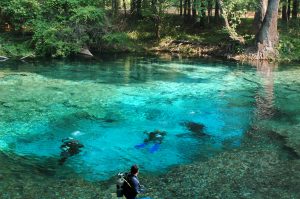
GAINESVILLE, Fla. — While most global warming headlines in mainstream media have focused on sea level rise, a new exhibit at the Florida Museum of Natural History investigates the health effects of climate change for North Central Florida residents.
Through photos and other images from a number of local, regional and national sources, “Changing Climate and Our Health” also provides concrete ways people can take action. The free exhibit is the latest in a series of displays highlighting world issues that influence humans’ daily lives.
“Climate change will impact everyone,” said exhibit project lead Katie Stofer of the University of Florida Institute of Food and Agricultural Sciences. “Focusing on our local area makes the problem much more meaningful and manageable. I’m hopeful the exhibit will promote conversation on this important topic.”
The exhibit examines air quality, variations in growing seasons and ranges of allergy-causing plants, as well as threats to the Floridan aquifer, which 93 percent of the state’s residents rely on for fresh drinking water.
Stofer said exhibit planning began nearly nine months ago when she and others began collecting input and questions on climate change and health from area residents.
Betty Dunckel, program director of the Florida Museum Center for Science Learning, describes the exhibit as a model for collaboration and action.
“It encourages visitors to think about how they can become involved to lessen effects.”
This exhibit was created by the Florida Museum in collaboration with the University of Florida College of Journalism and Communications and Institute of Food and Agricultural Sciences.
More information is available online at www.floridamuseum.ufl.edu/exhibits/limited-time-only/changing-climate or by calling 352-846-2000.
-30-
Writer: Sara Uman, smuman@ufl.edu
Source: Betty Dunckel, bdunckel@flmnh.ufl.edu; Kathryn Stofer, stofer@ufl.edu
Media Contact: Paul Ramey, 352-273-2054, pramey@flmnh.ufl.edu